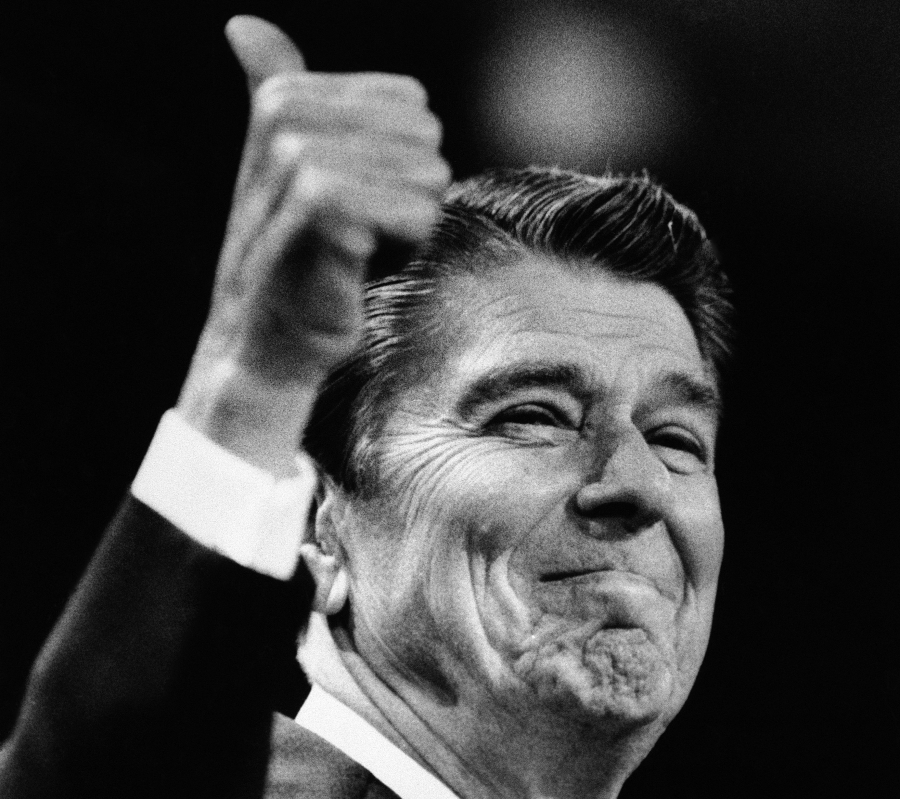At the end of his presidency, Ronald Reagan confessed to David Brinkley of ABC News that “there have been times in this office when I wondered how you could do the job if you hadn’t been an actor.”
It’s a signal moment in “The Reagan Show,” a documentary gleaned from endless hours of White House archival footage. The comment underscores how the former B-movie cowboy forever altered the nation’s highest office with his savvy use of the televised image.
In hindsight, suggest the filmmakers, this also anticipated the arrival of Donald Trump in the Oval Office
“You can’t underemphasize what a leap it was to have an actor become president,” said Sierra Pettengill, who co-directed the film with Pacho Velez. “That’s the beginning of a slide to having a reality TV star as president. … Trump’s ascendancy proved the thesis we were working on all along.”
The film, which had its television premiere Sept. 4 on CNN, views Reagan’s made-for-TV presidency almost exclusively through broadcast news and archival footage, much of it drawn from some 1,500 hours of material shot by the U.S. Naval Photographic Unit and stored at the Ronald Reagan Presidential Library and Museum. The trove of 16mm film and Betacam video had been little explored.
Pettengill cites journalist Mark Hertsgaard, author of “On Bended Knee: The Press and the Reagan Presidency,” who noted that, as a manipulator of the media, Reagan “took it all to a new level. He institutionalized how the president communicates to the public.”
Reagan came to political life with resources that set him apart from his peers. He “emerged from a long career in Hollywood with enormous skills to communicate,” said David Gergen, the CNN senior political analyst who served as Reagan’s director of communications and also worked in the Nixon, Ford and Clinton administrations. “They were natural skills he had before, but he honed them in his Hollywood days and then when he was on the road for General Electric in the 1950s. He really heard the voice of the people, and he could respond to it in ways that no other politician of his generation did.”
The film finds sardonic humor in Reagan’s folksy manner and miscues: his tongue-twisting over the pronunciation of former New Hampshire governor John Sununu’s name, for instance, or the infamous and not-really-so-funny “the bombing begins in five minutes” ad-lib, made when the president thought his microphone was off. The awkward asides are a reminder, Pettengill said, that “he wasn’t the best thespian.”
Yet, the film as often makes the case for Reagan as a leader who knew how to charm the press, a stark contrast to his current successor.
“He made the White House press pool comfortable,” Pettengill said. “They may have opposed his policies, but as a man they loved him.”
Gergen recalls how Reagan could disarm potentially tense encounters with the media.
“He was going into the press room for a really tough set of questions,” Gergen said, “and it was his birthday.” A few questions in, “Nancy (Reagan) and I … wheeled in a birthday cake, and it worked beautifully. Everybody cracked up. He cracked up. He took time to slice up the cake and give pieces to reporters.
“And by the way, we got off the issue.”
The “Great Communicator” also tried to apply his charm to his greatest rival, Soviet premier Mikhail Gorbachev, whom he most memorably exhorted to tear down the Berlin Wall in 1984. In Gorbachev, he met his match — and also an ally keen on ending the Cold War, even as he upstaged Reagan.
“The idea of Reagan meeting an equal adversary makes the story of those negotiations that much more interesting,” Pettengill said. The relationship becomes the focus of the film’s second half. The filmmakers leave out major elements of Reagan’s tenure, including his tragic neglect of the AIDS crisis and controversial domestic policies. They wanted to focus on how Reagan used public relations, performance and TV to end the Cold War, even as he helped to inspire “the entertainment-ization of politics,” in Velez’s parlance.



